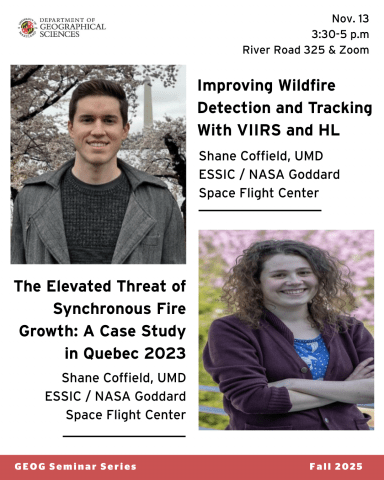GEOG Seminar 11/13: Tess McCabe & Shane Coffield, UMD-ESSIC/NASA Goddard Space Flight Center
Join us at 3:30 p.m. on Thursday, Nov. 13 for this seminar with Tess McCabe & Shane Coffield from the UMD Earth System Science Interdisciplinary Center (ESSIC)/NASA Goddard Space Flight Center.
Seminar 1: Improving Wildfire Detection and Tracking with VIIRS and HLS
Speaker: Shane Coffield, UMD ESSIC / NASA Goddard Space Flight Center
Satellite data are widely used both operationally and scientifically to quantify fire activity around the globe. However, there are several known factors limiting our ability to detect and track fires from space. For example, dense vegetation canopies, clouds, and smoke cover can obscure fire energy, as well as limited spatial and temporal resolution, and atmospheric view geometry effects. Our research aims to leverage additional lines of information, such as "candidate" fire detections from VIIRS and higher resolution infrared observations from Landsat and Sentinel-2, to better constrain fire dynamics in regions such as North America and the Amazon where increasingly common megafires threaten human health and ecosystems.
Seminar 2: The Elevated Threat of Synchronous Fire Growth: A Case Study in Quebec 2023
Climate change has intensified fire regimes globally, driving new extremes in fire behavior that challenge traditional fire management strategies. In Quebec in 2023, the number of large spreading fires overwhelmed suppression resources. Here, we present evidence that fire weather was the main driver of the timing of simultaneous fire spread in Quebec, and that weather forecasts may provide a promising means by which synchronous fire spread can be predicted in advance. Synchronous fire spread events like those of Quebec put outsized strain on suppression resources. Identifying and anticipating such synchronous spread across fires is paramount to adapting to new climate extremes.
For the Zoom link, please visit the GEOG Department Calendar.


